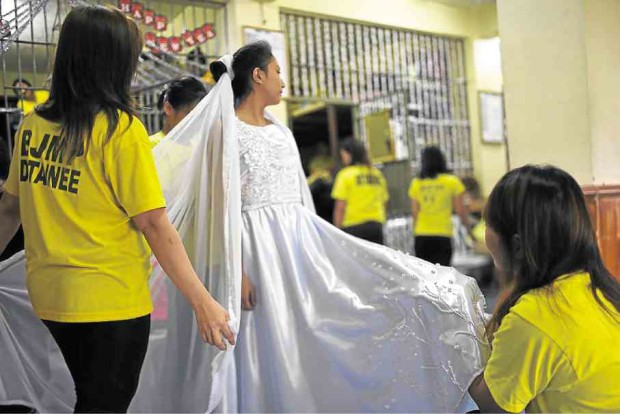
Four inmates of the Baguio City Jail Female Dormitory designed this bridal gown featured in a recent fashion show. —EV ESPIRITU
BAGUIO CITY—Her head held high, the striking 18-year-old woman marched down a scarlet runway at a Baguio café in November, in a dress designed by her mother. The two, however, did not share the limelight for this creation.
The woman’s 46-year-old mother, Rizza, is in jail. So are the other models’ moms—Sam, 33, Edith, 29, and Esther, 40—who designed and sewed the outfits on parade.
Staged on Nov. 30, Bonifacio Day, the fashion event sought to help raise money to finance their foray into the garments business.
The detainees are staying at the Baguio City jail’s female dormitory (BCJFD) and have asked that their identities be kept confidential.
Rizza was convicted for illegal recruitment, while Esther is serving sentence for estafa. Sam and Edith are among the 49 women standing trial for illegal possession of drugs and for drug trafficking.
But all four have skills that drew the attention of the warden, Senior Insp. April Rose Ayangwa.
Rizza is good at sewing beads and sequins, having worked for three years in a bridal boutique. Before she got into trouble, Esther used to produce and sell handwoven products. She recently got her certificate in tailoring from the Technical Education and Skills Development Authority.
In celebration of National Correctional Consciousness Month in October, the city jail held the fashion show, putting the four women to work with the help of 99 fellow detainees.
They used “inabel”—handwoven fabric from the Ilocos region and the Cordillera—but relied heavily on cloth available in Baguio stores. They wanted the clothes to be wearable, something that their children could use every day and produced modern ethnic, casual and formal wear.
Since most of the inmates are from the Cordillera, the four dressmakers were inspired by indigenous Filipino designs but used beadwork to provide the details. No bold ruffles and other elaborate accessories incorporated in their casual and formal wear, unlike dresses featured in couture fashion shows.
New high
Making beadwork for clothes designed and made by the other detainees was a new high for Sam and Edith.
Sam said she had used illegal drugs for several months due to peer pressure. She was tending a small store that sold mobile telephones in Kalinga province when her friends enticed her to use “shabu” (methamphetamine hydrochloride) for fun.
“I did not sell shabu. I occasionally used it. I happened to hang out with the wrong set of friends,” said Sam, who has a 10-year-old adopted daughter. She was caught in a buy-bust operation in 2011.
Edith, who has a 7-year-old daughter, said she used shabu out of curiosity. She was arrested in a police raid in Mountain Province in June.
Rizza earned a certificate of excellence in tailoring and dressmaking while serving her sentence. She had since been attracting clients.
She designed and made the uniform of the Baguio City Jail Choir, Harmony. Her youngest client bagged major awards twice in a costume play (cosplay) competition.
But there was one client who had brought Rizza sleepless nights: her daughter, a part-time ramp model. “I wanted her to be proud of me. I wanted her to shine and to look beautiful on the day that she wore my clothes,” she said.
At her work station, Rizza labored for days to finish the outfits. “We skipped meals because we were neck-deep in work. We got excited because we were part of the creation of beautiful clothes,” Edith said.
The clothes and the Nov. 30 show were all Ayangwa had hoped for. She started to oversee the jail facility in January, and set out to make its 103 detainees productive.
“We do not expect them to be hired [immediately] once they complete their prison terms. We wanted to train them so they have a source of income when they return to their families,” she said.
Productive
The city government and nongovernment organizations have helped finance the detainees’ interests in learning baking, tailoring, dressmaking and flower arrangement. Their products are sold at the display center of the city jail.
The detainees were happy to learn that their own children walked down the ramp to model their creations. Their youngest model was 2, their oldest 26. About a hundred people bought P500 tickets to watch the show.
Ayangwa said Rizza’s daughter exuded confidence and elegance as she had been taking on modeling assignments to support her education. “She must be very proud of what her mother had accomplished,” she said.
Inspired by the talent and efforts of the detainees, a businessman pledged to donate a complete set of sewing equipment.
Proceeds from the fashion show would be used to buy fabric, beads and sewing materials for the BCJFD tailor shop. This year, the female detainees would be accepting orders to support their families.
“I never imagined I can pursue my dream after my foray into drugs,” Sam said.
Edith said the show gave her and the other detainees a sense of fulfillment.
FAST FACTS
This year, the Bureau of Jail Management and Penology changed the word “inmate” to “people deprived of liberty” or PDL.
As of November 2016, there were 103 detainees at the Baguio City Jail female dormitory.
Forty-nine of the detainees have been charged with drug abuse and drug peddling, 29 are facing estafa and illegal recruitment charges, and the rest, qualified theft, child abuse, child trafficking and murder charges.